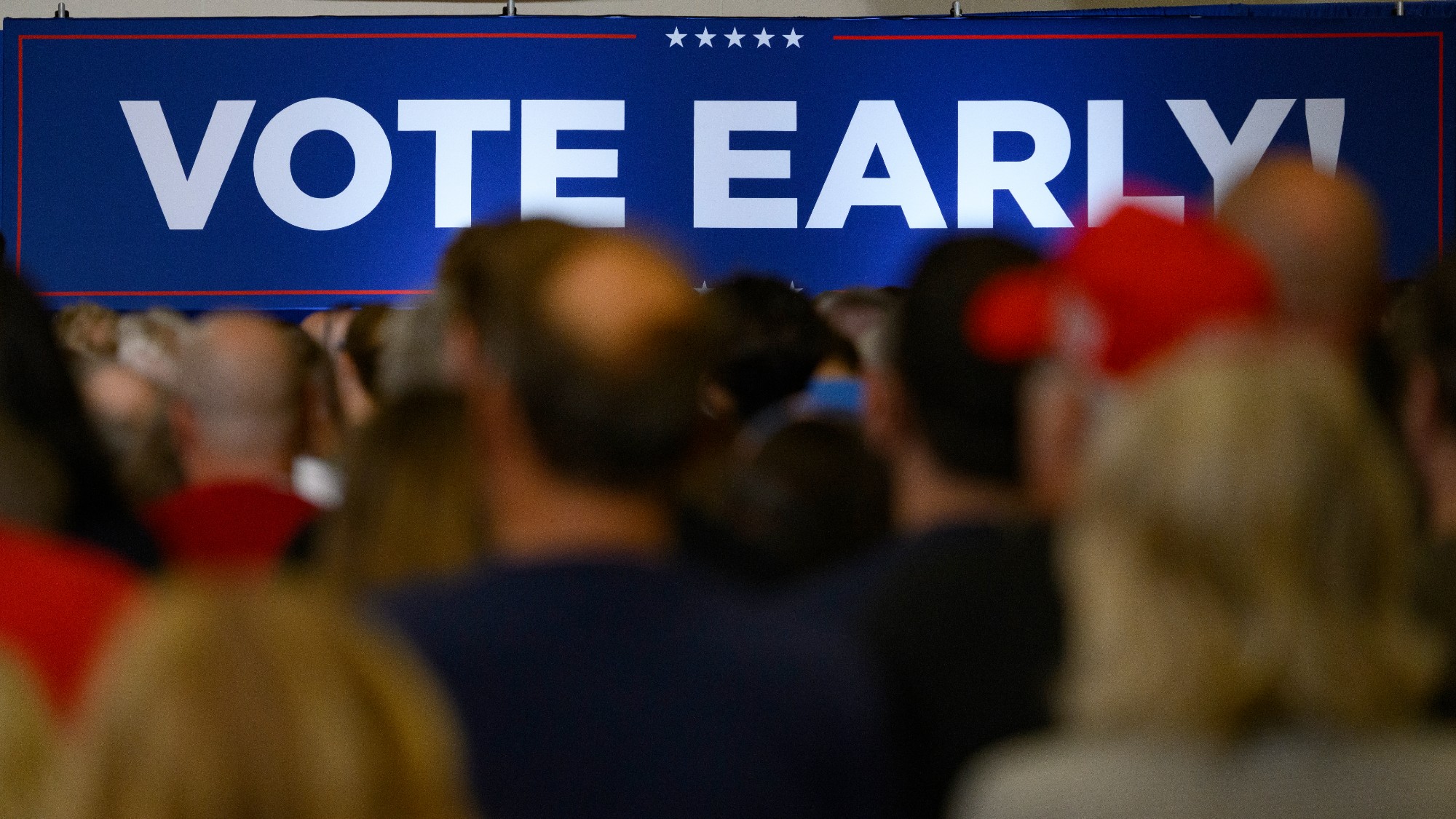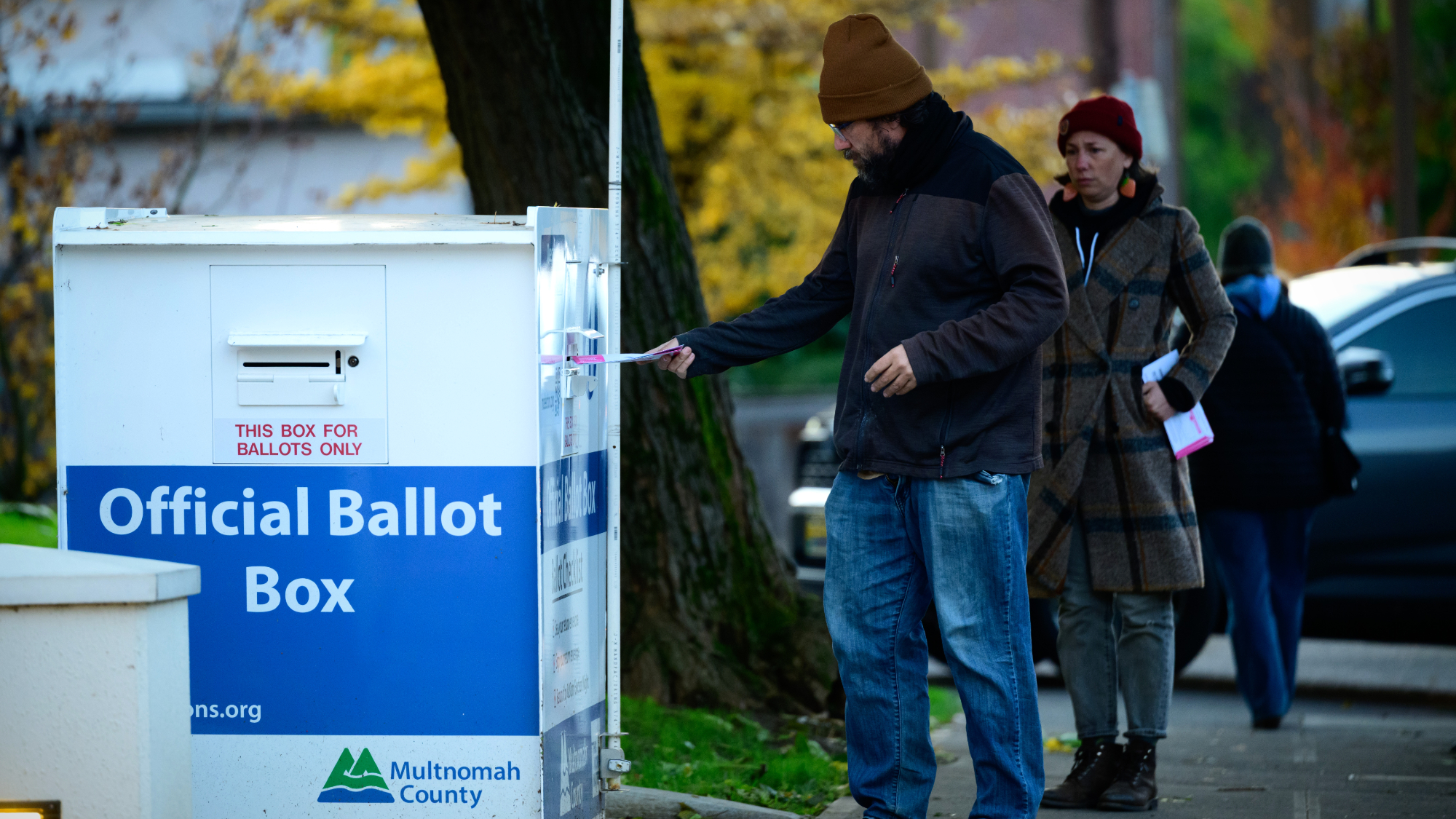When does early voting start in swing states?
A state-by-state guide to when voters can begin casting ballots in the battlegrounds


A free daily email with the biggest news stories of the day – and the best features from TheWeek.com
You are now subscribed
Your newsletter sign-up was successful
Procedures designed to increase voter turnout and improve accessibility by boosting the number of ways people can cast a ballot are part of what is known as "convenience voting." These practices became more widespread over the course of the 21st century, as policymakers began to seriously consider the difficulties some people have with voting in-person on Election Day — particularly low-wage workers, the elderly and those who lack access to reliable transit.
The best-known and most widely available form of convenience voting is early voting, which is where individuals can cast a ballot in-person, by hand-delivery or by mail in the days and weeks leading up to Election Day. Every state's procedures are different, though, so voters need to check with their state and local authorities about when, where and how to cast an early vote. If you are in a battleground state, follow these guidelines.
Arizona
Mail balloting was widespread and well-established in Arizona even before the Covid-19 pandemic accelerated interest in it, and the state still sees a disproportionate share of its electorate choose the voting method. In-person early voting and ballot drop-off begins 27 days before Election Day in Arizona, which falls on Oct. 9, 2024. In addition, voters choosing to vote by mail can begin receiving their ballots on Oct. 9.
The Week
Escape your echo chamber. Get the facts behind the news, plus analysis from multiple perspectives.

Sign up for The Week's Free Newsletters
From our morning news briefing to a weekly Good News Newsletter, get the best of The Week delivered directly to your inbox.
From our morning news briefing to a weekly Good News Newsletter, get the best of The Week delivered directly to your inbox.
Georgia
Early in-person voting and ballot dropoff begins on Tuesday, Oct. 15 in Georgia. Voters can choose any available polling place in their county to vote in person. Georgia also mails absentee ballots beginning on Oct. 7. Voters can get one for any reason, but must request it from the Georgia secretary of state's office. Voters must ensure that those ballots are received by 7 pm on Election Day.
Michigan
Michigan's early voting begins relatively late compared to other swing states, on Saturday, Oct. 26. Voters can also ask for an absentee ballot for any reason up to 40 days prior to Election Day, and the state started mailing them out on Thursday, Sept. 26. Most absentee ballots need to be returned by 8 p.m. on Election Day, unless voters are overseas or in the military, in which case they need to be postmarked by Nov. 5.
Nevada
All registered Nevada voters receive a mail ballot unless they opt out of the system. Mail ballots must be postmarked by Election Day and received within four days of the election. In-person early voting begins 17 days before the Nov. 5 general election, on Oct. 19, and ends four days prior to Election Day, on Nov. 1. As in many other states, individuals can choose from a list of authorized polling places for in-person early voting.
North Carolina
North Carolina was scheduled to be the first state to begin sending out mail ballots on Sept. 11, but the North Carolina Supreme Court ruled that independent Robert F. Kennedy's name be struck from the ballot, forcing officials to reprint the ballots at the last minute. The new ballots were sent out on Sept. 21. Absentee mail ballots can be requested for any reason and must be received by 7:30 p.m. on Election Day. In-person early voting begins at 8 a.m. on Thursday, Oct. 17 and concludes at 3 p.m. on Saturday, Nov. 2. Voters can choose between a list of early voting locations in their county.
A free daily email with the biggest news stories of the day – and the best features from TheWeek.com
Pennsylvania
The Keystone State has the most complicated early voting practices of all the swing states. There is no traditional in-person early voting, only what the state calls "in-person absentee balloting" in certain counties. That process can begin 50 days prior to the election — which would have been Sept. 16 this year — but has been held up by various court cases about the state's mail balloting laws. That means voters who wish to vote early will need to either apply for an absentee ballot online or download and mail an application to their county board of elections. Applications must be received by Nov. 1 at 5 p.m. Pennsylvanians are encouraged to contact their county board of elections to see if and when these options are available. In-person absentee balloting has already begun in some Pennsylvania counties and will conclude on Oct. 29.
Wisconsin
Just as in Pennsylvania, there is significant variation by municipality and county in terms of when early voting starts in Wisconsin. Early in-person absentee balloting begins on Oct. 22, and ends on Nov. 3, but the exact dates and times are set by the Badger State's cities, towns and villages. You can also apply for an absentee ballot by mail; ballots must be returned no later than 8 p.m. on Election Day. Absentee mail ballots have already begun to be sent out and received by the state.
David Faris is a professor of political science at Roosevelt University and the author of "It's Time to Fight Dirty: How Democrats Can Build a Lasting Majority in American Politics." He's a frequent contributor to Newsweek and Slate, and his work has appeared in The Washington Post, The New Republic and The Nation, among others.
-
 ‘Restaurateurs have become millionaires’
‘Restaurateurs have become millionaires’Instant Opinion Opinion, comment and editorials of the day
-
 Earth is rapidly approaching a ‘hothouse’ trajectory of warming
Earth is rapidly approaching a ‘hothouse’ trajectory of warmingThe explainer It may become impossible to fix
-
 Health insurance: Premiums soar as ACA subsidies end
Health insurance: Premiums soar as ACA subsidies endFeature 1.4 million people have dropped coverage
-
 ‘Poor time management isn’t just an inconvenience’
‘Poor time management isn’t just an inconvenience’Instant Opinion Opinion, comment and editorials of the day
-
 Judge blocks Trump suit for Michigan voter rolls
Judge blocks Trump suit for Michigan voter rollsSpeed Read A Trump-appointed federal judge rejected the administration’s demand for voters’ personal data
-
 Gabbard faces questions on vote raid, secret complaint
Gabbard faces questions on vote raid, secret complaintSpeed Read This comes as Trump has pushed Republicans to ‘take over’ voting
-
 How ‘Manchesterism’ could change the UK
How ‘Manchesterism’ could change the UKThe Explainer The idea involves shifting a centralized government to more local powers
-
 Judge tosses DOJ petition for Oregon voter data
Judge tosses DOJ petition for Oregon voter dataSpeed Read The decision was made following a letter sent by the DOJ to Minnesota
-
 ‘Dark woke’: what it means and how it might help Democrats
‘Dark woke’: what it means and how it might help DemocratsThe Explainer Some Democrats are embracing crasser rhetoric, respectability be damned
-
 San Francisco tackles affordability problems with free child care
San Francisco tackles affordability problems with free child careThe Explainer The free child care will be offered to thousands of families in the city
-
 Kelly sues Hegseth, Pentagon over censure
Kelly sues Hegseth, Pentagon over censureSpeed Read Hegseth’s censure was ‘unlawful and unconstitutional,’ Kelly said
